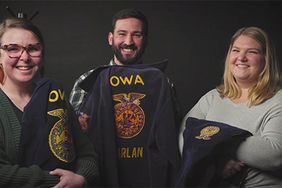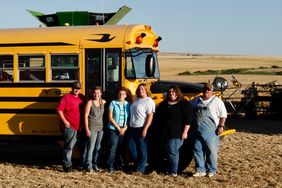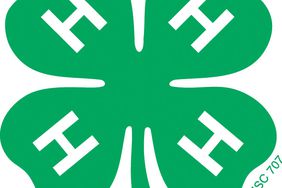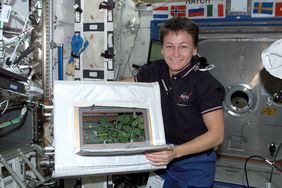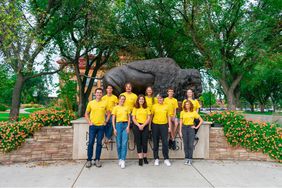:max_bytes(150000):strip_icc()/H2H-2-2-2000-8f2ac5678a4e4e2a9c8d0941a06279b8.jpg)
Members of the military are used to protecting our national security, but with the Heroes to Hives program, they are helping protect pollinators and our national food security by learning to become beekeepers.
This program provides beginner-level knowledge, experience, and connections to veterans, active-duty military members, National Guard members, reservists, and their dependents.
Since its inception in 2015, Heroes to Hives has trained more than 8,200 beekeepers through its free nine-month online beekeeping course.
The program runs each year from March through November, with registration open November through February. Students receive a monthly email with course content including pre-recorded video lectures, instructional videos, and handouts to go through at their own pace.
In October and November, students can take a test to earn a certificate of completion, which is recognized by USDA as a year of experience working in agriculture.
From Soldier to Founder
Adam Ingrao, pictured above, joined the Army in 2003, serving as a Patriot missile controller. While his unit was mobilizing for deployment the following year, he sustained a career-ending injury to his right ankle in the line of duty.
Since he was non-deployable, he received a medical discharge. "I had enlisted for six years and planned to do my 20 and retire," Ingrao says. "I didn't have a plan B, and it was hard to find purpose and figure out what life meant after the military. I struggled a lot."
Ingrao received treatment for his injuries from the Veterans Administration (VA) medical system. "The opioid epidemic was going on and the VA was handing them out like candy," he says. Once he was able, he found work as a mechanic. "I was using opioids and alcohol to function through the pain on a daily basis, and it became a problem."
In 2005, he had been out of the Army a little over a year when he met his wife, Lacey. "It was time to reevaluate my life," he says. "We wanted to focus on agriculture."
Ingrao earned a bachelor's degree in plant science from California Polytechnic State University San Luis Obispo, where he took his first beekeeping class. "It spoke to me in a way that nothing had spoken to me since I left the military," he says. "I felt like I could help my nation by protecting this pollinator that was in decline."
He had found his calling. "That first time in the apiary was a spiritual experience," Ingrao says. "I had to be present. I couldn't think about my injury or my friends in the military who never came back. I wasn't reliving the things that were bogging me down. Everything changed from that point on."
While working on his PhD at Michigan State University in 2014, he and Lacey — who has a master's degree in psychology — started a two-acre urban farm in Lansing, which of course included bees. "We were talking about the transformative experience beekeeping had in my life and decided to see if other veterans would have the same experience. We wanted to offer this to other vets, so we started this program in with support from Michigan Food and Farming Systems."
Heroes to Hives is Born
:max_bytes(150000):strip_icc()/heroeshives-2-f9119fe3bf5f4ab7a61bd0cc73106bc3.jpg)
The summer of 2015, the Ingraos welcomed five veterans onto their farm. "They worked bees with me for nine months," he says. "The response from the veterans was incredible, but the response from their spouses was even more meaningful, saying, 'I don't know where he'd be if it weren't for this.' It was clear they were experiencing the same transformative experience I had."
Ingrao started talking about the program around Michigan, and the next year, they had 15 vets sign up. He began working for Michigan State University Extension and moved the program there, and Heroes to Hives took off. Those first four years, it was only open to Michigan residents, but after receiving requests from across the country, out-of-state participants were accepted beginning in 2019.
In addition to their work with Heroes to Hives and other endeavors, The Ingraos own Bee Wise Farms in Newberry, Michigan. They produce lavender, herbs, cut flowers, and honeybee products.
Today, Heroes to Hives is a non-profit collaboration between Michigan State University Extension, Michigan Food and Farming Systems, Bee Wise Farms, the University of Missouri Extension, University of Minnesota, and University of Nebraska-Lincoln.
In Missouri, course participants can receive hands-on training at the University of Central Missouri's Mitchell Street farm, plus get region-specific management tips from Extension beekeeping experts and network with regional beekeeping organizations and service providers.
In Nebraska, coursework can be applied to the educational requirements for the apprenticeship level of certification with Great Plains Master Beekeeping. Much like a master gardener program, this regional network provides training, education, outreach, and mentoring. Participants can advance through the apprentice, journeyman, and master levels at their own pace, and can also gain hands-on knowledge at UNL's Bee Lab Research Apiary.
"I had to be present. I couldn't think about my injury or my friends in the military who never came back." - Adam Ingrao
Minnesota participants receive real-world beekeeping training and can attend in-person workshops at apiaries in Minneapolis and Rochester.
Ingrao says states have been added slowly to ensure quality. "I'm more focused on the sustainability of the program," he says. "We need to make sure our partners have the finances and are dedicated to the program." In-hive training in Indiana, Pennsylvania, and Maryland will be added next year, with more states to come eventually. The online course, however, has been taken by veterans all across the country and around the world.
Many participants ask about getting bees when they start the program, but Ingrao says, "I tell our students, 'You're collecting intel this year, like in the military. This is not the year to do your mission. Do your intel and your recon and next year you'll have what you need for your mission.'"
The mission for Heroes to Hives graduates may be getting further education, establishing their own beekeeping business, seeking employment with commercial beekeepers, or diversifying their current farms.
Student Success Story
One of those graduates is Marine veteran Nick Kaminski, pictured below. He had been beekeeping for three years, following one bare-bones class and information he had found online. "We had some challenges and failures — some pretty devastating — but we've learned and grown through each of those experiences," he says.
:max_bytes(150000):strip_icc()/H2H-5-2-8dc90654279d4a29993af3e9990d1992.jpg)
"When I signed up for Heroes to Hives, I knew how to handle hives but didn't know the finer points of hive health, nutrition, and integrated pest management," Kaminski says. "The experience I gained working with Adam and Heroes to Hives made all the difference for me because I could combine that technical knowledge with my own experience and became a more well-rounded beekeeper."
After the course, he added more hives and at Ingrao's recommendation, signed up for a veterans entrepreneur program through Grand Valley State University. Unbeknownst to Kaminski, it was actually a pitch competition, akin to the popular show Shark Tank.
"Honeybees are livestock we use to produce food." -Nick Kaminski
"I didn't know at the time that I was going to win the grand prize," he says. "I invested that $5,000 straight into the apiary and didn't look back. My goal was to become a commercial beekeeper."
Today, Kaminski and his wife, Nicole, run Hickory Tree Farm Apiaries near Kent City, Michigan. The operation has expanded from a stationery apiary in Michigan to a migratory operation in multiple states. "He's one of our greatest business successes," Ingrao says.
"I call my beekeeping journey a divine intervention," Kaminski says. When he was a child, a neighbor kept bees and brought honey to his family, and he developed an interest in bees. He got into beekeeping when his wife came across an ad for a class on a bulletin board. "She signed me up without asking me," he says. "I'd never even mentioned my interest to her."
While technical knowledge is crucial, Kaminski says mindset is also important for beekeepers. "Whether they have ten or 5,000 hives, successful beekeepers care about the well-being of the bees and the desire to do well by them is intrinsic to their very being. It's something that can only be described as a desire to nurture, because at the end of the day, they may look like insects to most people but they are a living, breathing animal that requires food, medicine, and caring. Honeybees are livestock we use to produce food."
Looking to the Future
As Heroes to Hives continues to grow and expand, Ingrao says there are a lot of things going on behind the scenes, including work with the Veterans Administration and Department of Defense.
A handful of VA facilities offer beekeeping, including the Manchester (New Hampshire) VA Medical Center. "Veterans in that program engage in beekeeping and wellness activities in the apiary," Ingrao says. "We've been collecting outcomes on the therapy of beekeeping and working to develop wellness practices with the VA for other organizations to implement."
Ingrao is also working with the Department of Defense, offering beekeeping education to soldiers in recovery units who are being medically transitioned out of the military due to injuries.
The first group, from Fort Hood, Texas, is going through the course right now. They get all the materials at once outside the regular course schedule, work through it at their own pace as they recover, then take the test for their certificate of completion.
Some Heroes to Hives graduates are becoming instructors themselves. "One of the more fulfilling experiences is the opportunity to share my knowledge," Kaminski says. "I went through two instructor tours in the Marines so I have a good skill set for training."
Ingrao is thrilled when his students go on to teach other beekeepers. "A lot of our veterans are looking for ways to give back to the community," he says. "We are trained to be leaders in the military. The civilian world doesn't necessarily look at vets as leaders or instructors but they want to share their knowledge. We give them the tools to do that."
Learn more and register
Current and former service members, their spouses, and their adult children can click here to register for the H2H online course. Learn more at the Heroes to Hives website.
:max_bytes(150000):strip_icc()/LisaFoustPrater-5d5284849acc417c8678324f9c660161.jpg)

